For assessibility purposes, the following page is also available as a PDF via:
From 2018-19 there are a number of changes for undergraduate programmes. The Harmonised Scheme of Award is being replaced with the UK-standard modules, credits and academic levels and there are changes to the regulations for Module Assessment, Condonement and Classification.
This is a summary of the main changes. Please also take some time to read and digest the regulations themselves.
Credit Framework
From 2018-19, UCL’s undergraduate programmes will integrate fully with the UK Framework for Higher Education Qualifications which is already in use on our taught postgraduate programmes:
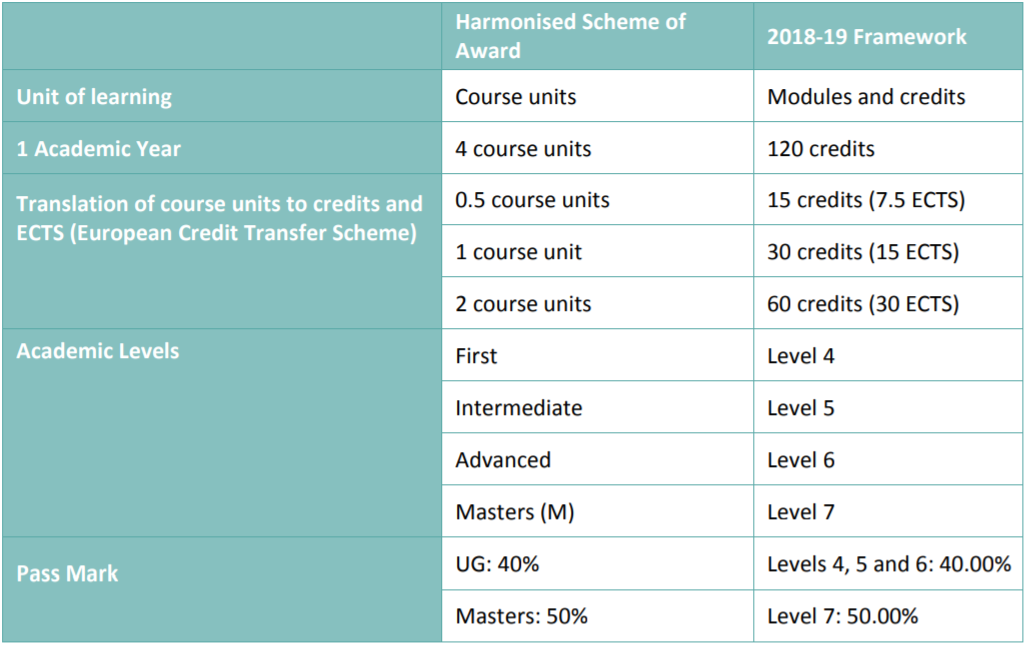
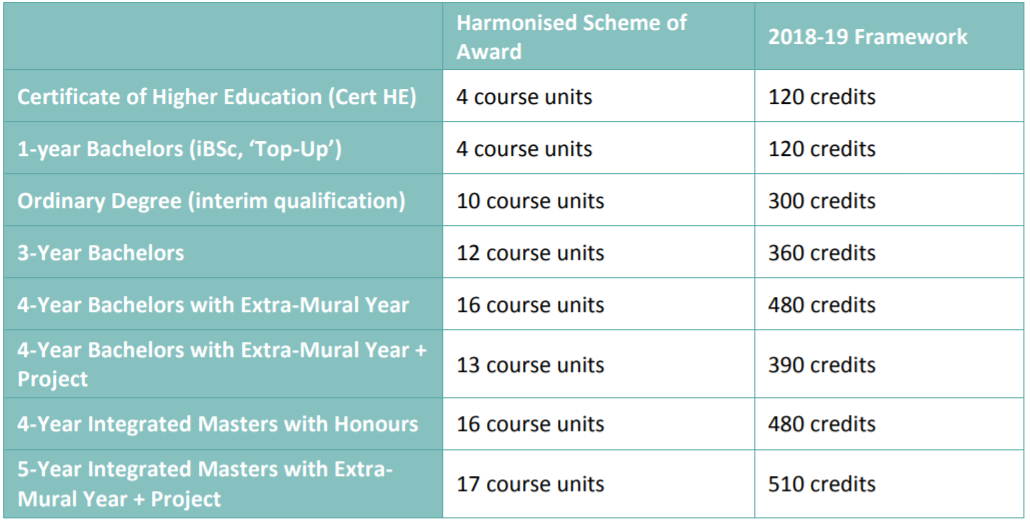
Criteria to Pass a Module
The way in which component marks are combined to create the module mark has been standardised. The changes apply to all students who are fully enrolled on the 2018-19 academic session.
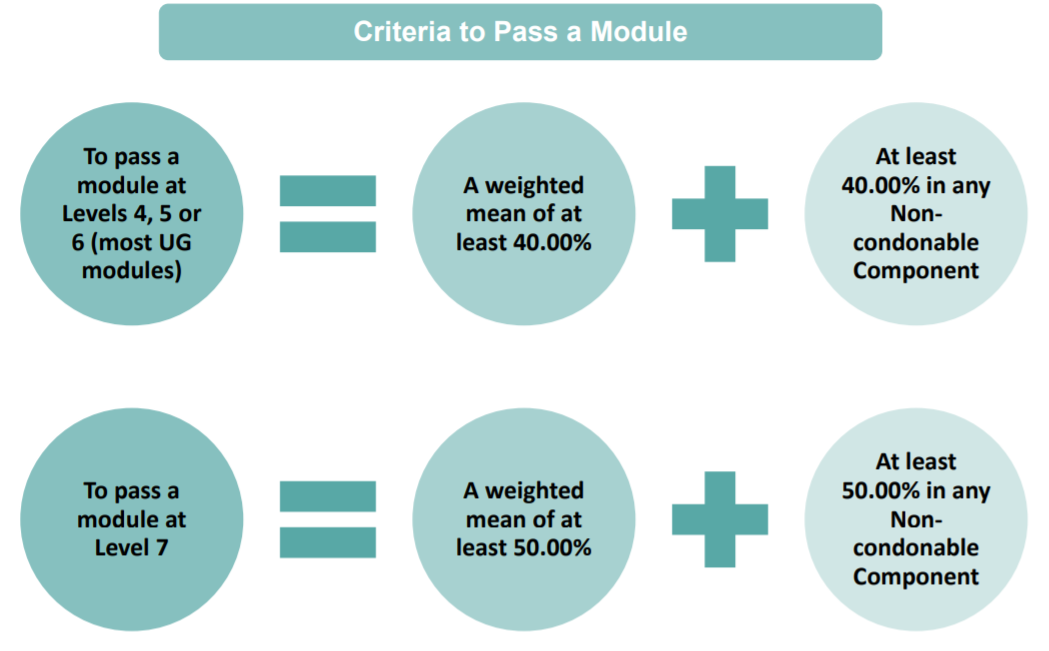
The module mark is normally determined from just the weighted mean of all components. This means that a student could receive a mark of 0.00% in one component and still pass the module if they do well in the other components.
However, if a component is essential to professional accreditation or essential to achieving a degree in a particular field of study, it may be designated as ‘Non-Condonable’ for a particular programme i.e. it must be passed. It is only possible to have a Non-Condonable Component within a Non-Condonable Module.
This system replaces the former ‘Completion’ requirements and any ‘Qualifying Marks’ which were in place on individual programmes.
More information: Chapter 4, Section 3: Module Assessment
Condonement Criteria
From 2018-19, there are new Progression and Award Requirements for undergraduate programmes, including new Condonement regulations.
Condonement allows a student to progress through their programme and be awarded a UCL degree even if they are carrying a small amount of failure, as long as their overall performance is good.
In each year of study, full time students should Pass 120 credits. If not, the Condonement Criteria will be applied:
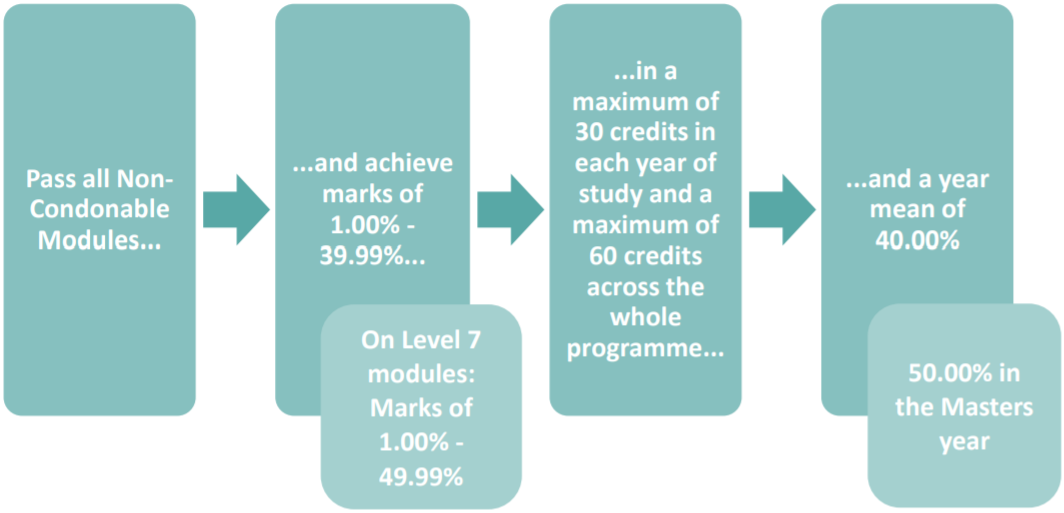
- Marks of 0.00% are reserved for No Attempt or Minimal Attempt at an assessment. Students cannot be Condoned if they have a mark of 0.00% for a module.
- The regulations also apply to one-year programmes such as the iBSc and Bachelors Top-Up. However the ’maximum 60 credits across the whole programme’ rule does not apply to these programmes.
- On part time programmes such as the Cert HE Astronomy, the Condonement Criteria are adjusted pro-rata.
Applying Condonement
The way in which Condonement is applied has been standardised across UCL. This includes the following principles:
- If a student meets all of the Condonement Criteria, they will be condoned and will not be reassessed.
- If a student does not meet all of the Condonement Criteria, including failing more than the maximum number of Condonable Credits, they will be reassessed in all of the failed modules, including those in the Condonable Range.
- If a student submits a valid claim for Extenuating Circumstances, they will normally be offered a Deferral before Condonement is considered.
- Modules are normally ‘Condonable’. However if a module is essential to professional accreditation or essential to achieving a degree in a particular field of study, it may be designated as ‘NonCondonable’ for a particular programme.
- All Optional and Elective Modules are Condonable unless they are essential to professional accreditation.
- All undergraduate dissertations are Non-Condonable.
- Condonement is determined by the student’s parent Programme, not on a module-by-module basis.
- The Interim Qualification requirements now allow for Condoned credit.
- Condonement does not apply on non-modular programmes such as the MBBS and Fine Art. There are separate arrangements in place on BA English.
- The new regulations apply to all other new and continuing students who are fully enrolled on the 2018-19 academic session.
More information: Chapter 4, Section 9: Progression and Award
Classification Algorithms
From 2018-19, there will be new Classification regulations for modular undergraduate programmes. The changes apply to new UG students only i.e. the regulations will be phased in. For continuing students, the existing classification algorithms can be found in Chapter 4, Section 15: Classification for UG Students First Enrolling in 2017-18 or Earlier.
The majority of new students in 2018-19 will fall under CLASSIFICATION SCHEME A:

The main difference from the Harmonised Scheme of Award is a slight increase in the number of credits which can be dropped from the calculation in year 2. Programmes in Engineering, MAPS, and the School of Pharmacy will be using CLASSIFICATION SCHEME B to meet the requirements of various professional bodies.
The main difference from Scheme A is that marks cannot be dropped from the classification:

Programmes in Laws will be using CLASSIFICATION SCHEME C to meet the requirements of professional bodies. The main difference from Scheme A is that 1 st year marks are excluded, and all 2nd year marks are included:

The new algorithms do not apply to non-modular programmes, such as the MBBS, BA English and Fine Art.
More information: Chapter 4, Section 10: Classification
Borderline Marks
The new regulations include a standardised approach to the formulae used to combine marks so that all students across UCL are treated equally. This includes: Averaging, Rounding, Decimal places, Marking scales, Pass marks, Reporting of component marks, Calculation of module marks, Calculation of progression and award, and Calculation of classifications.
The way in which borderlines are considered has also been standardised across UCL and will be similar to the system already in use on UCL’s postgraduate programmes. The following formula will be applied to marks near the First border:
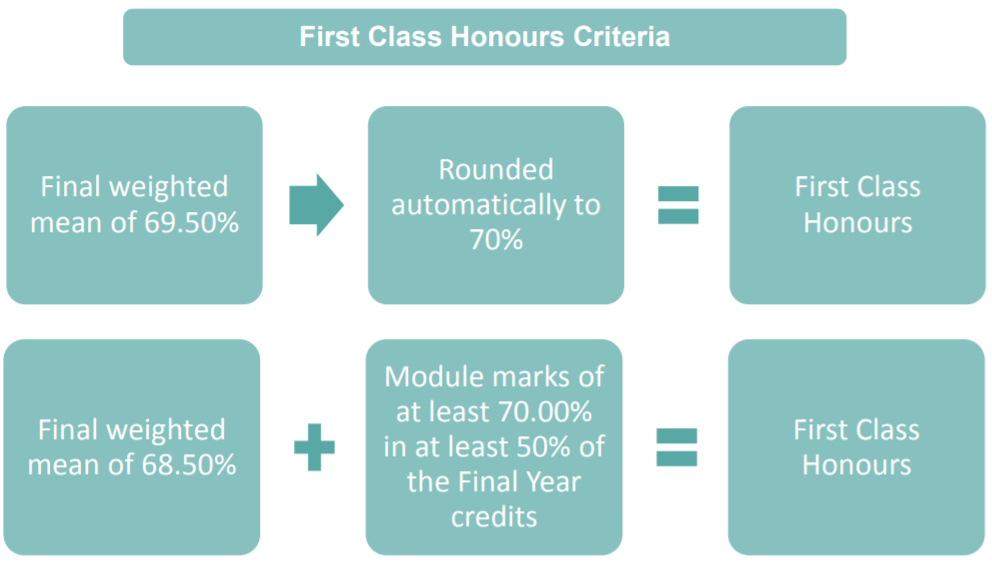
The same principles apply to the 2.1 and 2.2 borderlines (marks of 59.50% will be rounded up automatically, etc.) As borderlines are part of the Classification regulations, the changes will apply to new UG students only i.e. the regulations will be phased in.
For continuing students, the existing borderline criteria are located in Chapter 4, Section 15: Classification for UG Students First Enrolling in 2017-18 or Earlier.
The new criteria do not apply to non-modular programmes, such as the MBBS, BA English, and Fine Art.
More information: Chapter 4, Section 10: Classification
When do the regulations apply?
For the majority of new and continuing undergraduate students, the new regulations apply as soon as the 2018-19 academic session begins.
There are a few students who will still be subject to the 2017-18 regulations:
Students Repeating Modules from 2017-18
Students who are Repeating modules from the 2017-18 academic session will be ‘fully enrolled’ on the 2018-19 academic session and therefore subject to the 2018-19 regulations.
Students Deferring Modules from 2017-18
Students who are Deferring with Tuition will be ‘fully enrolled’ on the 2018-19 academic session and therefore subject to the 2018-19 regulations.
For students who are trailing a Deferral with or without Tuition from 2017-18 in tandem with their 2018-19 modules, the 2017-18 regulations for Module Assessment and Progression apply to the trailed modules. The 2018-19 regulations for Module Assessment, Progression and Award, and Classification apply to all modules undertaken for the first time in 2018-19.
Students Returning from Interruption
Students who are returning from an Interruption and enrolling on the 2018-19 academic session should be subject to the 2018-19 regulations. However if the student completed all of the teaching before the Interruption and is only returning to be assessed, the 2017-18 regulations will apply.
Contact: academicregulations@ucl.ac.uk
 Close
Close

